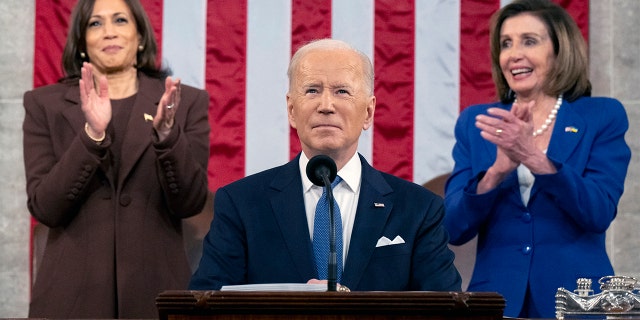The one thing Biden could do right now to turn our economy around
Trade is the engine that creates jobs and America's drives economic growth
Sometimes what isn’t said is just as important as what is said. So, when President Joe Biden spoke for one hour, 12 minutes and 40 seconds during his State of the Union address, the American business community noticed something was lacking — he barely mentioned the word "trade."
Is trade no longer important to our State of the Union? As a matter of fact, it’s more important than ever. The number of jobs supported by trade has nearly tripled in the past 30 years to 41 million. That’s one in every five U.S. jobs, a share twice as large as three decades ago.
Trade is the beating heart of economic growth and job creation in this country. Trade results in lowers costs for American consumers — something that is desperately needed at a time when families struggle with high prices caused by inflation.

Liberal pundits weren’t happy when President Biden failed to connect domestic issues to Russia’s attack on Ukraine. (Saul Loeb, Pool via AP)
But the president’s speech speaks volumes about the administration’s view of trade. U.S. Trade Representative Katherine Tai recently lamented how, in her judgment, "Trade became a game of numbers, a race to the bottom — while a handful of corporations and elites reaped their gains, working families and communities were left behind."
BIDEN'S TRADE REP SNAPS AT GOP LAWMAKER WHO SAID SHE WAS 'TOO NICE' FOR THE JOB: 'I DON'T NEED YOUR PITY'
Further, Tai has called free-trade agreements "a very 20th century tool," suggesting that we don’t want to "we don't spend years and spend a lot of blood, sweat and tears working on something that isn’t relevant to the need of our people and our economies."
If those comments — made by the administration’s top trade adviser — reflect their views on this critical topic, then it’s no wonder they have shown little interest in pursuing any market-opening trade deals. The truth is, these views aren’t supported by the facts, by U.S. business or by the American people.
Those millions of jobs created by trade pay really well. According to the U.S. Department of Commerce, manufacturing jobs tied to exports pay wages that are, on average, 18% higher than non-export-related jobs pay.
And it’s remarkable how little support this defensive view of trade actually enjoys.
Congress doesn’t agree. Democrats and Republicans have been lining up in hearings to ask: Where’s the market access that new free trade agreements (FTA) provide? With 95% of the world’s consumers living outside our borders, exporting more Made-in-America products can be an engine of growth.
MOST AMERICANS DON'T BELIEVE THEIR CHILDREN WILL BE BETTER OFF: POLL
The American people don’t agree. By nearly a two-to-one margin, Americans are "more likely to see foreign trade as an opportunity for economic growth rather than a threat to the economy," according to Gallup.
Most economists don’t agree. Survey after survey of economists finds strong and widespread expert support for open trade and rejection of protectionism.
The U.S. business and agriculture communities certainly don’t agree. American farmers and ranchers depend on exports, and FTAs are how they secure better access to foreign markets. Similarly, nearly half of U.S. manufacturing output is exported, but high tariffs in big emerging markets can be insurmountable.
CLICK HERE TO GET THE OPINION NEWSLETTER
Business services are increasingly tradable thanks to the internet, but this source of growth may be cut off without new FTAs to set rules of the road and keep the digital trade lanes open.
Trade enhances not only our standard of living but our standing in the world. America’s military leaders are quick to point out their preference for the "soft power" of trade and diplomacy over the "hard power" of military force: The former is a bargain compared to the latter — both in terms of treasure and of blood. Simply put: trade pacts enhance our national security, forging deeper ties with allies at a time when we need to stand up to increasingly aggressive autocratic forces.
A decade has passed since the U.S. has added a new country to the list of 20 where we have FTAs. Meanwhile, the WTO reports that other countries have inked more than 100 in this period.
Trade agreements don’t have to be hard. Does anyone really think an FTA with the UK, our closest ally, couldn’t win overwhelming support from Congress? Why can’t we resume negotiations with Kenya, an exciting economy that could give the U.S. a model for closer engagement with Africa?
CLICK HERE TO GET THE FOX NEWS APP
A market-opening trade agenda is an obvious part of a pragmatic government agenda. It will spur growth and opportunity without adding to the deficit or fueling inflation. It would help the nearly 300,000 small businesses that are exporters.
If Biden truly wants to strengthen the state of our union, he should start not only talking about trade but pursuing the kind of deals that lift up our entire country.
No comments: